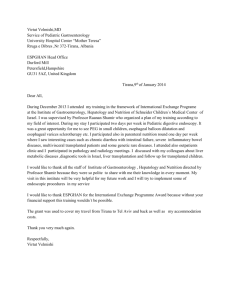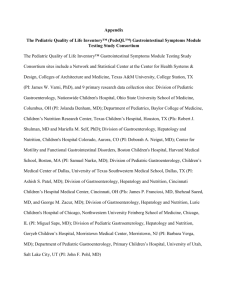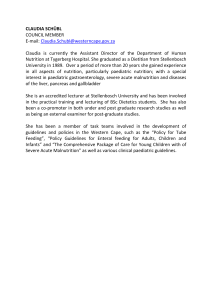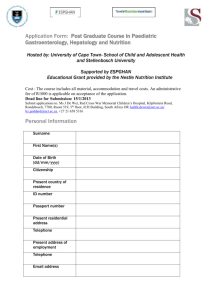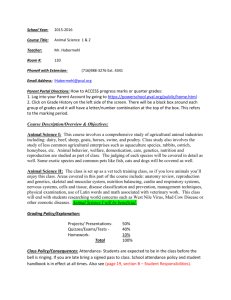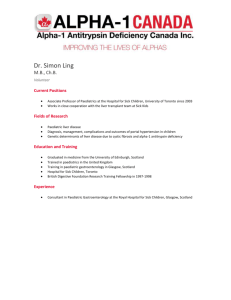TRAINING IN PEDIATRIC GASTROENTEROLOGY
advertisement
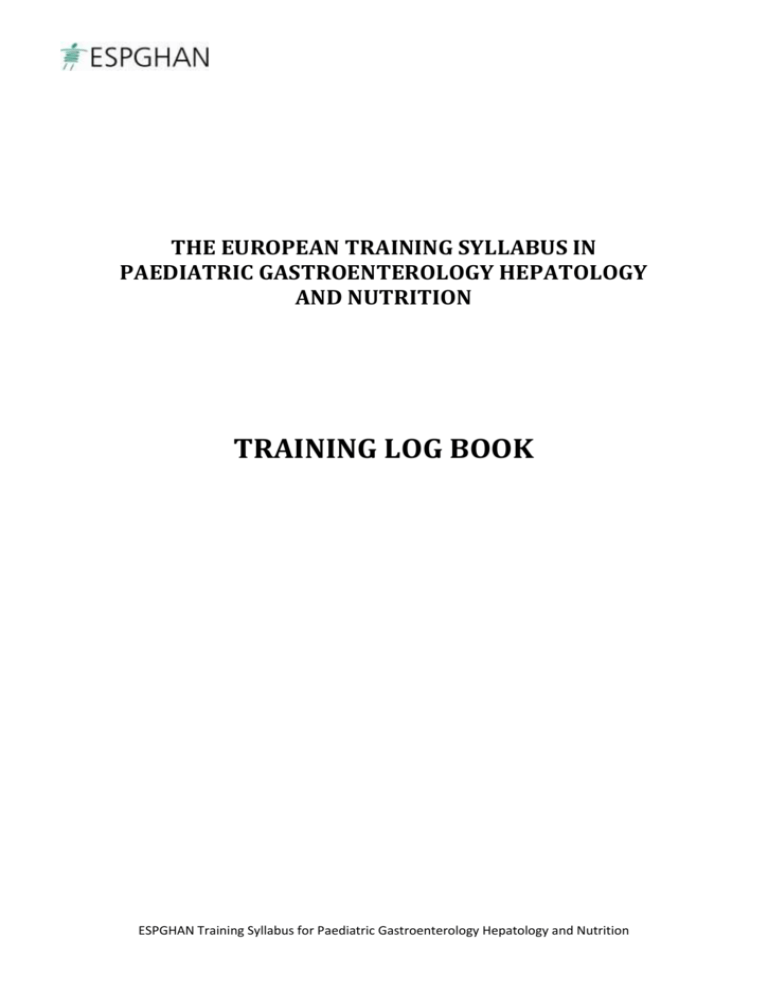
THE EUROPEAN TRAINING SYLLABUS IN PAEDIATRIC GASTROENTEROLOGY HEPATOLOGY AND NUTRITION TRAINING LOG BOOK ESPGHAN Training Syllabus for Paediatric Gastroenterology Hepatology and Nutrition Note to Trainee This self assessment refers to the ESPGHAN syllabus for training in Paediatric Gastroenterology, Hepatology and Nutrition, and is designed to help you and your supervisor review skills, and identify any gaps. As a way of assessing your knowledge and clarity of understanding, ask yourself “Could I explain this condition/treatment/procedure clearly, logically and persuasively to a consultant colleague in another specialty, who is seeking advice about their own child?” The conditions are those the trainees might expect during their training and therefore to some extent act as a marker of the breadth of experience available in their post. Please fill it (rate according to the code below), in pencil initially so that you can change it if necessary, and discuss it with your local tutor or mentor, before your annual review. Note to Supervisor Please go through this evaluation with the trainee and discuss whether you agree with his/her own self-ratings. If not, try to come to a consensus. Method of learning L = Lesson/lecture P = Practical/hands-on E = e-learning Coding for self-assessment Knowledge 1 = I do not feel knowledgeable or competent in this topic. 2 = I have reasonable knowledge but no confidence. 3 = I have dealt with one or a few cases of this condition/problem. 4 = I feel I am reasonably competent to manage and explain this condition or problem. 5 = I feel able to assume complete responsibility for this condition (or within the multidisciplinary team if applicable) Skills and attitudes 1 = I have never seen or done this. 2 = I have observed but not done. 3 = I have done one or a few but I do not feel competent. 4 = I can undertake this but still want support to be available. 5 = I feel able to undertake this on my own responsibility. ESPGHAN Training Syllabus for Paediatric Gastroenterology Hepatology and Nutrition A. Newborn and Congenital Abnormalities of the Gastrointestinal Tract A.1. Knowledge 1 2 3 4 5 6 7 8 9 10 11 12 13 14 Embryological origins of the GI tract Derivation of the vascular supply of the gut Normal histology throughout the GI tract Physiology of the neonatal gastrointestinal tract Antenatal diagnosis of GI problems Anatomical abnormalities of development including: diaphragmatic hernia, tracheoesophageal fistula, omphalocele, gastroschisis, volvulus, small bowel atresia, Hirschsprung disease, malrotation Potentially associated abnormalities Recognition and treatment of necrotizing enterocolitis Consequences of neonatal gut problems including short-bowel syndrome Composition of breast milk, and different/special milk formulas Physiology of lactation Diagnosis and management of gastroesophageal reflux in the newborn Knowledge of the intestinal epithelial abnormalities e.g. microvillus atrophy, congenital chloride diarrhoea, and abetalipoproteinaemia Indications and contraindications to referral for small bowel transplantation A.2. Skills A.2.1. Clinical skills 1 Interpretation of plain abdominal x-ray in the newborn 2 Interpretation of contrast studies used in the newborn 3 Differential diagnosis of bilious vomiting in term and pre-term infant 4 Differential diagnosis and investigation of a neonate with an abdominal mass. 5 Prescription of enteral and parenteral nutrition in the preterm infant 6 Investigations for jaundice in the term and preterm infant 7 Care of the patient with short bowel syndrome A.2.2. Technical skills 1 Understanding of need and risk of central line placement 2 Use and care of central venous catheters A.3. Attitudes 1 Positive promotion of breast feeding in term and preterm infant 2 The special ethical considerations of neonatal ultrashort gut syndrome 3 Counselling of family with antenatal diagnosis of a gut/liver abnormality ESPGHAN Training Syllabus for Paediatric Gastroenterology Hepatology and Nutrition A. Newborn and Congenital Abnormalities of the Gastrointestinal Tract Date Method of Learning Self Appraisal 1-5 Comments Supervisor’s Signature & Date A.1. Knowledge 1 2 3 4 5 6 7 8 9 10 11 12 13 14 A.2. Skills A.2.1. Clinical skills 1 2 3 4 5 6 7 A.2.2. Technical skills 1 2 A.3. Attitudes 1 2 3 ESPGHAN Training Syllabus for Paediatric Gastroenterology Hepatology and Nutrition B. Acute and Chronic Diarrhoea B.1. Knowledge 1 Be able to evaluate complex cases of malabsorption 2 Common diarrhoeal pathogens in a) Community acquired infection b) Hospital acquired infection c) The immunocompromised patient 3 Constitution of different oral rehydration therapies 4 Causes of chronic diarrhoea in developed and developing world 5 Basic knowledge of gut immunology 6 Auto-immune enteropathy (e.g. IPEX) and other immunological causes of chronic diarrhoea (e.g. CGD, GVHD) 7 Intractable diarrhoeas of infancy 8 Small bowel bacterial overgrowth: pathophysiology, diagnosis and management 9 Gastroenterological problems encountered in patients with AIDS 10 Coeliac disease: a) genetics; b) presentation and symptoms; c) serological testing; d) screening of high risk populations; e) short and long term complications; f) histopathological changes B.2. Skills B.2.1. Clinical skills 1 Differentiating between secretory and osmotic diarrhoea 2 Assessing dehydration and initiating appropriate treatment 3 Deciding when a child with diarrhoea needs admission 4 Differential diagnosis of a patient with chronic diarrhoea 5 Interpreting a small bowel biopsy 6 Ordering investigations for a patient with suspected malabsorption 7 Assessing adherence to a gluten free diet 8 Interpreting a DEXA bone deonsitometry result B.2.2. Technical skills 1 Taking basic anthropometrical measurements 2 Care and trouble shooting of gastro- and jejunostomies ESPGHAN Training Syllabus for Paediatric Gastroenterology Hepatology and Nutrition B. Acute and Chronic Diarrhoea Date Method of Learning Self Appraisal 1-5 Comments Supervisor’s Signature & Date B.1. Knowledge 1 2 3 4 5 6 7 8 9 10 B.2. Skills B.2.1. Clinical skills 1 2 3 4 5 6 7 8 B.2.2. Technical skills 1 2 ESPGHAN Training Syllabus for Paediatric Gastroenterology Hepatology and Nutrition C. Motility disorders C.1. Knowledge 1 Detailed understanding of the pathophysiology of normal gastrointestinal transit mechanisms 2 Causes of intestinal pseudo-obstruction, Hirschprung disease, gastroparesis, achalasia 3 Epidemiology, aetiology, clinical presentation and treatment options for infantile colic 4 Pathophysiology of vomiting 5 Pathophysiology of gastro-oesophageal reflux in health and disease 6 Complications of gastro-oesophageal reflux disease (GERD) 7 Surgical treatments for GERD including indications for surgery and commonly encountered short and long term complications 8 Understanding indications for gastrostomy, fundoplication, transpyloric feeding and management of complications 9 Gastrointestinal problems in neurologically impaired children 10 Causes of organic constipation 11 Surgical treatments of chronic constipation C.2. Skills C.2.1. Clinical skills 1 Differential diagnosis of a patient with acute and chronic vomiting 2 Interpreting an oesophageal pH-impedence study 3 Interpreting transit studies and anorectal, colonic and ileal manometry 4 Differentiating organic and idiopathic constipation 5 Devising a management plan for a patient with encopresis 6 Attendance at multi disciplinary radiology and histopathology meetings C.2.2. Technical skills 1 Performing an oesophageal pH study 2 Motility studies (optional), impedance, multichannel oesophageal manometry 3 Oesophageal dilatation (optional) C.3. Attitudes 1 Understanding families with a child with chronic constipation and related problems, infantile colic and feeding disorders 2 Understanding and sympathetic approach to families of patients with neurodevelopmental impairment C.4. Treatments 1 2 3 4 Commonly used anti-emetics, prokinetics Developing a stepwise treatment to GERD Mechanisms of action of gastroprotective drugs Mechanisms of action of commonly prescribed laxatives C. Motility disorders ESPGHAN Training Syllabus for Paediatric Gastroenterology Hepatology and Nutrition Date Method of Learning Self Appraisal 1-5 Comments Supervisor’s Signature & Date C.1. Knowledge 1 2 3 4 5 6 7 8 9 10 11 C.2. Skills C.2.1. Clinical skills 1 2 3 4 5 6 C.2.2. Technical skills 1 2 3 C.3. Attitudes 1 2 C.4. Treatments 1 2 3 4 ESPGHAN Training Syllabus for Paediatric Gastroenterology Hepatology and Nutrition D. Surgical problems of the Gastrointestinal Tract D.1. Knowledge 1 2 3 4 5 Differentiation of abdominal masses Clinical presentation of pyloric stenosis Clinical presentation of intussusception Causes of intestinal obstruction Pathogenesis, pathology, clinical features and treatment options in Hirschsprung disease 6 Aetiology, pathology and clinical presentation of short bowel syndrome 7 Treatment regimens used in short bowel syndrome D.2. Skills D.2.1. Clinical skills 1 Differential diagnosis and investigation of a patient with acute abdominal pain 2 Differential diagnosis and investigation of a child with an abdominal mass 3 Investigation of a patient with suspected pyloric stenosis 4 Investigation of a patient with suspected intussusception 5 Managing a patient with an ingested foreign body 6 Interpreting a rectal biopsy including features found in a patient with Hirschsprung disease 7 Management of short bowel syndrome 8 Indications for referring a patient with intestinal failure for small bowel transplant assessment 9 Stoma care and management of high output D.2.2. Technical skills 1 PEG placement (optional) D.3. Attitudes 1 Positive approach to the shared care of patients between different hospital teams 2 Ethical issues surrounding small bowel transplantation ESPGHAN Training Syllabus for Paediatric Gastroenterology Hepatology and Nutrition D. Surgical problems of the Gastrointestinal Tract Date Method of Learning Self Appraisal 1-5 Comments Supervisor’s Signature & Date D.1. Knowledge 1 2 3 4 5 6 7 D.2. Skills D.2.1. Clinical skills 1 2 3 4 5 6 7 8 9 D.2.2. Technical skills 1 D.3. Attitudes 1 2 ESPGHAN Training Syllabus for Paediatric Gastroenterology Hepatology and Nutrition E. Inflammatory bowel disease E.1. Knowledge 1 Knowledge of different aetiological factors in disease development 2 Understanding normal mucosal immunology and the changes in IBD 3 Recognising the different presentations of IBD in children compared to adults 4 Macroscopic and microscopic features of Crohn’s disease, ulcerative colitis and indeterminate colitis 5 Extraintestinal manifestations: joints, cutaneous, hepatic, ophtalmic 6 Understanding complications of IBD, including: malnutrition, osteoporosis, risk of dysplasia 7 Be familiar with anti-inflammatory, immunomodulators and biological drugs 8 Indications for surgery in IBD 9 Knowledge of commonly used scoring systems in IBD patients 10 Vaccinations in patients with IBD E.2. Skills E.2.1. Clinical skills 1 Organising appropriate investigations for suspected IBD including: bloods/serology, markers of disease activity, radiology, endoscopy 2 Writing a concise clinic letter covering outpatient and inpatient management 3 Attendance at histopathology meetings 4 Interpretation of DEXA scans 5 Choosing a treatment based on type, location and severity of disease 6 Participation in paediatric transition and adult IBD clinics E.2.2. Technical skills 1 Upper GI endoscopy including paediatric and adult patients (100 supervised procedures recommended) 2 Ileo-colonoscopy including paediatric and adult patients (50 supervised procedures recommended) E.3. Attitudes 1 Counselling children and parents in advance about the procedures involved in diagnosis 2 Explaining the diagnosis of IBD compassionately and offering suitable literature 3 Working as part of a multidisciplinary team 4 Realising the major psychosocial impact of the disease 5 Continuing disease education for patients and parents E.4. Treatments 1 Nutritional treatment options for IBD including elemental and polymeric feeds 2 Mechanisms of action, side effects, toxicity and routine monitoring for patients on aminosalicylates, corticosteroids and immunosuppressants 3 The role of biologics and their complications ESPGHAN Training Syllabus for Paediatric Gastroenterology Hepatology and Nutrition 4 Drugs used for patients who have abnormal DEXA scans 5 Bowel preparation regimens for colonoscopy ESPGHAN Training Syllabus for Paediatric Gastroenterology Hepatology and Nutrition E. Inflammatory bowel disease Date Method of Learning Self Appraisal 1-5 Comments Supervisor’s Signature & Date E.1. Knowledge 1 2 3 4 5 6 7 8 9 10 E.2. Skills E.2.1. Clinical skills 1 2 3 4 5 6 E.2.2. Technical skills 1 2 E.3. Attitudes 1 2 3 4 5 E.4. Treatments 1 2 3 4 5 ESPGHAN Training Syllabus for Paediatric Gastroenterology Hepatology and Nutrition F. Nutrition F.1. Knowledge 1 The normal nutrient requirements of growing infants and children including estimates of energy and macro and micronutrients 2 Physiology of nutrient digestion, absorption, metabolism, and elimination 3 Pathophysiology of malnutrition 4 Specific nutrient deficiencies including iron, zinc, copper, selenium, folate, vitamins A-E, and essential fatty acids 5 The role of nutrition in specific disease conditions: extensive burns, malignant disease, cardiac disease, renal disease and neuro-developmental impairment 6 The epidemiology, aetiology and clinical features of anorexia and bulimia nervosa 7 The epidemiology, aetiology and clinical features of childhood obesity 8 An understanding of nitrogen balance 9 The techniques used for measuring dynamic nutritional parameters e.g. resting energy expenditure 10 Knowledge of the short and long term effects of malnutrition in the infant, child and adolescent 11 Knowledge of the haematological and biochemical indices of nutritional status 12 The role of nutrition support teams in hospital and community settings 13 Knowledge of the common nutritional problems in patients with cystic fibrosis 14 Long term health implications of genetic programming F.2. Skills 1 Being able to measure length, weight, head circumference, midarm circumference and triceps skinfold thickness and use them to assess current and long term growth 2 Calculating a patient’s body mass index and applying this information to specific clinical situations 3 Ability to take a detailed diet history 4 Attendance at nutritional support meetings (optional) 5 Devising a management plan for an obese patient F.3. Attitudes 1 Working as an active member of a multi disciplinary nutritional support team with emphasis on communication and team building 2 Counselling patients and families about the benefits and risks of enteral and parenteral nutrition 3 Achieve supportive and sympathetic approach to a patient with a chronic eating disorder F.4. Enteral Feeding (combining knowledge and skills) 1 Indications and contraindications for commencing enteral feeds 2 Composition of different enteral feeds 3 Awareness of the role of different members of the nutritional support team in the establishment of and maintenance of patients on enteral nutrition 4 Practical knowledge of the availability of different nasogastric tubes and ESPGHAN Training Syllabus for Paediatric Gastroenterology Hepatology and Nutrition 5 6 7 8 gastrostomy devices Short and long term complications of enteral feeding Preparing a patient for discharge on home enteral feeding Changing a gastrostomy Insertion of a percutaneous endoscopic gastrostomy (optional) F.5. Parenteral Nutrition (combining knowledge and skills) 1 Indications and contraindications for commencing parenteral feeding 2 Composition of different parenteral feeds 3 Awareness of the role of different members of the nutritional support team in the establishment of and maintenance of patients on parenteral nutrition 4 Short and long term complications of parenteral feeding 5 Preparing a patient for discharge on home parenteral feeding 6 Investigating and managing a patient on parenteral feeding with pyrexia F.6. Special problem: failure to thrive (combining knowledge and skills) 1 Pathophysiology of carbohydrate, protein and fat absorption in relation to failure to thrive 2 Differentiating the wasted patient from the stunted patient 3 Plotting measurements on centile charts including velocity and disease specific charts 4 Diagnosis and investigation of a patient with failure to thrive ESPGHAN Training Syllabus for Paediatric Gastroenterology Hepatology and Nutrition F. Nutrition Date Method of Learning Self Appraisal 1-5 Comments Supervisor’s Signature & Date F.1. Knowledge 1 2 3 4 5 6 7 8 9 10 11 12 13 14 F.2. Skills 1 2 3 4 5 F.3. Attitudes 1 2 3 F.4. Enteral Feeding (combining knowledge and skills) 1 2 3 4 5 6 7 8 F.5. Parenteral Nutrition (combining knowledge and skills) 1 2 3 4 5 6 F.5. Special problem: failure to thrive (combining knowledge and ESPGHAN Training Syllabus for Paediatric Gastroenterology Hepatology and Nutrition skills) 1 2 3 4 ESPGHAN Training Syllabus for Paediatric Gastroenterology Hepatology and Nutrition G. Hepatology G.1. Knowledge 1 Common causes of prolonged neonatal jaundice including extrahepatic biliary atresia, genetic cholestasis, metabolic and infectious causes 2 Infectious causes of hepatitis including viral hepatitis A-E 3 Metabolic liver disorders such as Wilson’s disease, alpha-1-antitrypsin deficiency, cystic fibrosis 4 Knowledge of the causes of acute liver failure 5 Knowledge of the causes of chronic liver disease including those needing transplantation 6 Pathology and clinical presentation of autoimmune liver disease and sclerosing cholangitis 7 Pathophysiology of portal hypertension 8 Presentation, investigation and treatment of portal hypertension 9 Indications and contraindications to liver transplantation 10 Mechanisms of malnutrition in patients with chronic liver disease G.2. Skills G.2.1. Clinical skills 1 Interpretation of a normal liver biopsy and recognition of histological patterns of liver diseases 2 Investigation of jaundice including an infant with conjugated hyperbilirubinaemia 3 Interpretation of abnormal liver function tests 4 Managing a patient with significant GI bleed due to portal hypertension 5 Investigation, treatment and follow up of patient with vertical transmission of hepatitis B &C 6 Referring a patient for liver transplant assessment 7 Routine outpatient care following liver transplant including monitoring for complications G.2.2. Technical skills 1 Percutaneous liver biopsy (20 supervised procedures recommended) 2 Upper GI endoscopy with banding or sclerotherapy of oesophageal varices (optional) 3 Ascitic tap 4 Endoscopic retrograde cholangiopancreoscopy (ERCP) (optional) G.3. Attitudes 1 Counselling a family of an infant with prolonged cholestasis 2 Ethical considerations surrounding liver transplant G.4. Treatments 1 2 3 4 Prescribing fat soluble vitamins and ursodeoxycholic acid Drugs used to treat an episode of ascending cholangitis Prescription of diuretics for ascites Prescription of common immunosuppressive drugs e.g. cyclosporin, tacrolimus and adjusting the dose according to drug levels ESPGHAN Training Syllabus for Paediatric Gastroenterology Hepatology and Nutrition G. Hepatology Date Method of Learning Self Appraisal 1-5 Comments Supervisor’s Signature & Date G.1. Knowledge 1 2 3 4 5 6 7 8 9 10 G.2. Skills G.2.1. Clinical skills 1 2 3 4 5 6 7 G.2.2. Technical skills 1 2 3 4 G.3. Attitudes 1 2 G.4. Treatments 1 2 3 4 ESPGHAN Training Syllabus for Paediatric Gastroenterology Hepatology and Nutrition H. Miscellaneous Clinical Topics (not covered elsewhere) H.1. Knowledge 1 Epidemiology, aetiology, pathology and clinical features of a patient presenting with GI bleeding 2 Pathophysiology of common disorders of exocrine pancreatic dysfunction 3 Macro and micronutrient consequences of exocrine pancreatic dysfunction 4 Knowledge of exocrine pancreatic dysfunction in cystic fibrosis and Schwachmann-Diamond syndrome 5 Epidemiology and mechanisms of disease in Helicobacter Pylori infection and peptic ulcer disease 6 Long term consequences of Helicobacter Pylori infection 7 Definition and clinical features of food allergy H.2. Skills H.2.1. Clinical skills 1 Resuscitation of a patient with a significant GI bleeding 2 Prescribing pancreatic enzyme supplements 3 Interpreting a sweat test 4 Diagnosing Helicobacter Pylori by different diagnostic methods 5 Evidence based prescribing of Helicobacter Pylori eradication regimens 6 Diagnosing and treating a patient with suspected food allergy 7 Indications for investigating a patient with recurrent abdominal pain H.2.2. Technical skills 1 Pancreatic function tests 2 Injection of bleeding ulcers (optional) 3 Be able to perform an endoscopic removal of an ingested foreign body 4 ERCP (optional) 5 Interpretation of MRCP 6 Endoscopic USS (optional) ESPGHAN Training Syllabus for Paediatric Gastroenterology Hepatology and Nutrition H. Miscellaneous Clinical Topics (not covered elsewhere) Date Method of Learning Self Appraisal 1-5 Comments Supervisor’s Signature & Date H.1. Knowledge 1 2 3 4 5 6 7 H.2. Skills H.2.1. Clinical skills 1 2 3 4 5 6 7 H.2.2. Technical skills 1 2 3 4 5 6 ESPGHAN Training Syllabus for Paediatric Gastroenterology Hepatology and Nutrition I. Research and management I.1. Knowledge 1 2 3 4 5 6 7 How to undertake an evidence based search of medical literature Knowledge of basic medical statistics Critical appraisal of published literature Knowledge of the various steps in the audit process Understanding the ethics applicable to research submission The role of the research and development department Sources of funding for research projects including charities I.2. Skills 1 2 3 4 5 6 7 8 9 10 11 12 13 Writing a research grant application Writing an abstract Being the author of a research paper in peer reviewed journal Presentation of poster/paper at local, national and international research meetings Presentation at a journal club Computer literacy in searching for and presenting evidence Conduct a clinical audit Writing an ethics application Participation in undergraduate and post-graduate teaching Development of core teaching material to enable regular teaching participation Organising a post graduate teaching programme Subscribe for trainee membership of a PGHN society MD/PhD relevant to paediatric gastroenterology, hepatology and nutrition I.3. Attitudes 1 Maintaining a commitment to continuing self education and teaching I.4. Management 1 Organising a rota 2 Know the structure of the national health system on local, regional and national scale 3 Preparing comprehensive discharge summaries 4 Organising an endoscopy list 5 Attendance at a medical directorship meeting 6 Understanding clinical governance 7 Face complaints procedure and how to respond to a complaint 8 Budget control and writing a business plan ESPGHAN Training Syllabus for Paediatric Gastroenterology Hepatology and Nutrition I. Research and management Date Method of Learning Self Appraisal 1-5 Comments Supervisor’s Signature & Date I.1. Knowledge 1 2 3 4 5 6 7 I.2. Skills 1 2 3 4 5 6 7 8 9 10 11 12 13 I.3. Attitudes 1 I.4. Management 1 2 3 4 5 6 7 8 ESPGHAN Training Syllabus for Paediatric Gastroenterology Hepatology and Nutrition
